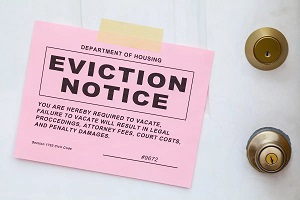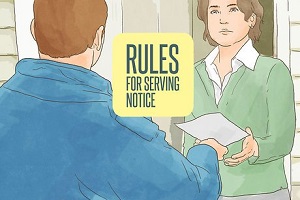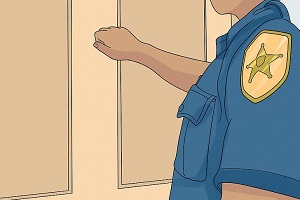
LAW FIRM BLOG
New York State Eviction Process 2022
March 22, 2022
New York State evictions follow the same general legal process. However, no two evictions are exactly the same. One of the factors that affects the entire process is the individual lease/rental agreement. Additionally, each possible ground for eviction has its own rules for how the process starts. Landlords in New York can begin the eviction process for several reasons, including:
1. Nonpayment of Rent
Rent is considered late a day past its due date, although New York law requires a 5-day grace period, and a lease/rental agreement may provide for a longer period. Landlords may charge a late fee for the late payment of rent. But they may only do so after the statewide grace period and the lease/rental agreement must state that any late rent payments will result in a late fee. Late fees cannot be more than $50 or 5% of the rent, whichever is less.
Many landlords provide a 10-day grace period before declaring the tenant in default. The default state refers to a tenant who failed to pay rent after the grace period. This is normally when the landlord can send their first eviction notice and begin the eviction process.
Before a landlord can try to evict a tenant for nonpayment of rent, they are required to send a letter to the tenant via certified mail (not e-mail) at least five days past the due date to inform the tenant that the landlord has not received the rent.
If the tenant still fails to pay or confirms that rent is still unpaid or does not reply, the landlord may proceed with a written 14-Day Notice to Pay. This notice gives the tenant the option to pay the past due amount in full within 14 days to avoid eviction. If the tenant pays the rent amount in full prior to the end of the 14th day, the eviction process will be stopped, and the tenant will be allowed to remain in the rental unit. If the tenant still does not pay and continues living in the property by the end of the 14 days, then the landlord may file an eviction Petition with the court.
The tenant must respond to the Petition within 10 days. A hearing will be set for 3-8 days after their response is received by the court. If there’s no response, the court may rule for the landlord. However, a tenant can pay rent in full or move out of the property any time prior to a hearing and the eviction process does not continue.
[N.Y. Real Prop. Acts § 711(2)]
2. Violation of the Lease/Rental Agreement
A tenant can be evicted in New York State if they violate any terms of a written lease or rental agreement. Landlords must provide tenants with a 10-Day Notice to Comply giving the tenant that time to correct the issue in order to avoid eviction before moving forward with the eviction process. If the tenant resolves the issues on time, the eviction process does not continue.
Typical lease violations include:
• Damaging rental property;
• Repeated public disturbances;
• Smoking in non-smoking areas;
• Keeping pets in pet-free properties;
• Having too many people residing in the rental unit;
• Subletting rooms.
If the tenant fails to resolve the violations after the initial ten days, the landlord must give them a second notice called a 30-Day Notice to Quit. Now the tenant can no longer resolve the violations and must vacate the property. This notice informs them of the end of their lease/rental agreement. If the tenant continues living in the rental property and does not vacate after the 30-day notice period expires, the eviction process continues.
Note that illegal activity is not included in this category.
3. Conducting Illegal Activity
In New York, if a tenant has engaged in illegal activities/behavior within the property, the landlord is not obliged to provide them a written notice prior to pursuing eviction. The landlord can proceed with the eviction process immediately. New York landlords have broad authority to determine which illegal activities warrant eviction. New York tenants can face immediate eviction if the landlord has documentation of illegal activities occurring on the premises.
Examples of illegal activities are:
• Involvement in the creation, distribution, or consumption of illegal drugs;
• Domestic abuse;
• Prostitution.
Whether the tenants correct the violation or not, they are not allowed to stay in the property once the court makes a decision.
4. Non-renewal of the Lease After the Rental Period Ends (Tenant at Will)
If there is no lease or the term of the lease has ended, the landlord does not need any additional reason to end the tenancy as long as proper notice is given. The amount of notice a tenant receives depends on the length of the lease/terms of their lease and how long they’ve stayed on the property.
In the state of New York, if tenants “hold over,” or stay in the rental unit after the rental term has expired, then the landlord must give tenants notice before evicting them. This includes tenants without a written lease and week-to-week and month-to-month tenants. Often this type of eviction applies to tenants who are at the end of their lease and the landlord simply doesn’t want to renew the lease.
No Lease/End of Lease –Required Notice
If the rental term has ended and the tenant remains on the property, the landlord may provide a Notice to Quit. For lease terms or tenancies:
• Less than One Year--30 days’ notice is required.
• More than One Year (but Less than Two Years)--60 days’ notice is required.
• More than Two Years--90 days’ notice is required.
Filing a Complaint
The eviction process can only proceed after the issuance of the formal written notice. The landlord must have allowed the required time to pass before beginning to file for eviction. The eviction process is as follows:
1. Proceed to the justice court in the city or town where the rental property is located;
2. File a Petition and Notice of Petition and include copies of the following: Notice to Quit, the lease/rental agreement, and proof/documentation that supports the petition.
3. Pay the court fees. Fees will vary depending on the kind of eviction case, the location of the rental property, and the justice court where the Petition and Notice of Petition were filed.

Serving the Tenant
A copy of the Notice of Petition and Petition is served to the tenant. It must be served 10-17 days before the hearing. There are several methods to accomplish this:
• Personal Service - The court official delivers a copy of the Notice of Petition and Petition to the tenant in person any day except for Sundays or the tenant’s religious observance days;
• Substituted Service - If the tenant is unavailable, someone who lives or works with the tenant who is over the age of 18 may receive the documents, and copies are mailed via first class mail and registered/certified mail; or
• Posting- The server leaves a copy of the documents in a secure and visible place by the entrance of the property. Posting the petition and notice in a conspicuous place or under the “entrance door” of the rental unit and copies are mailed via first-class and registered/certified mail.
Landlords are not allowed to serve the documents to the tenant themselves. They must have someone uninvolved in the case do it for them.
There are also specific requirements for choosing the person who will serve the documents to the tenant.
• They must be a Professional Process Server or an adult;
• The person must not have served on behalf of the landlord more than five times in one year.
After Filing and Serving the Petition
The Petition and Notice of Petition must be served on the tenant 10-17 days prior to the hearing date. The hearing date is chosen and set at the time the landlord files their petition for eviction with the court.
The tenant always has 10-17 days to prepare for the hearing. A response or reply is not required unless the eviction is about the nonpayment of rent. If the case is about the nonpayment of rent, the tenant has to send a reply within 10 days before the hearing is scheduled. A hearing is then scheduled 3-8 days after the court receives the tenant’s reply.
Court Hearing and Judgment
A tenant will not have an opportunity prior to the hearing to respond to the eviction (except evictions for nonpayment of rent) and must appear if they want to explain why they should not be evicted. Should the tenant not show up to the hearing, the landlord wins by default. If the landlord fails to appear at the hearing, the entire case is dismissed.
Postponement
Either party--the tenant or landlord--may request a postponement (adjournment) of the trial court date. The Court will allow for a minimum of 14 days.
Court Hearing and Evidence
If the tenant disagrees with the Petition and replies, they must attend the hearing and provide sufficient evidence to contest the landlord’s claims. If a tenant wants to contest the eviction, they should bring any documentation to the hearing, which is when the tenant can present reasons for why they shouldn’t be evicted, or why there shouldn’t be a hearing in the first place.
Similarly, the landlord has the responsibility of providing evidence. The evidence they provide may include, but is not limited to:
• Copy of the deed and lease
• Rent receipts and ledgers
• Bank statements
• Witnesses
• Photo and video documentation of the violations and correspondence, etc.
Writ of Execution
If the court rules in the landlord’s favor, the landlord will ask the court to issue a Writ of Execution. They can request it immediately at the hearing after the judgment is passed.
The Writ of Execution is a tenant’s final 14-day notice to vacate the rental unit and gives them the opportunity to remove their belongings before they are forcibly removed from it by a marshal, sheriff, or constable, unless the eviction is for nonpayment of rent, in which case the tenant will only have ten days to move out.
Provided that the tenant does not appeal for reconsideration—which is a long and complicated process in the state of New York—a Writ of Execution is issued a few hours to a few days after the hearing.
The Writ of Execution gives the tenant a maximum of 14 days to vacate the property unless the judicial officer grants a stay.
Stays
Tenants may receive a stay of execution from the court which gives them more time before they have to vacate the property.
The following are a few circumstances where a stay of execution is granted for extreme hardship, allowing a prolonged stay of not more than one year:(although the tenant will still have to move out once the stay period expires):
• A child will be displaced from their school district;
• A tenant has a serious, debilitating health condition;
• Other family issues that will be decided on a case-by-case basis.
If the tenant is evicted for a lease violation, the judge can grant them 30 days to correct the violation. In case they manage to correct the violation and inform the court in time, the eviction process does not continue and the tenant may remain in the rental unit and will not be evicted.
If the tenant is being evicted for nonpayment of rent, they have 10 days to either move out or pay the rent. The eviction process is discontinued if the tenant is able to pay the rent.
If no stay of execution is granted, then the tenant has 14 days from the moment they receive the Writ of Execution to move out of the property. After the 14 days are up, the tenant can then be forcibly removed from the property by the appropriate officials. It is usually a sheriff who does this.
The landlords themselves are never allowed to use force to remove the tenant. If the tenant leaves behind any belongings, the landlord must contact the tenant and give them a reasonable timeframe to claim them. After the timeframe has passed, the landlord is allowed to sell or dispose of the tenant’s property.

Retaliatory Evictions
It is illegal for a landlord to evict a tenant for complaining to the landlord or to the appropriate local or government agency regarding the property. It is also illegal for a landlord to evict a tenant for joining, supporting, or organizing a tenant organization or union.
Evicting a Squatter
If the individual occupying the property did not have the permission of the landlord when initially moving in, then in New York, they must be given a 10-day Notice to Quit, after which an owner/landlord may proceed with the eviction process as with any other eviction.
New York Eviction Process Timeline Summary
Below is a summary of the amount of time the eviction process takes in New York. These estimates can vary greatly, and time periods may not include weekends or legal holidays.
1. Initial Written Notice Period--Between 14 and 90 days, depending on the notice type and reason for eviction.
2. Issuance/Service of Summons and Petition--10-17 days.
3. Court Hearing and Ruling on the Eviction--Within the same 10-17 day period as step 2, more if a postponement is requested.
4. Issuance of Writ of Execution--A few hours to a few days.
5. Return of Possession--10-14 days; longer if a stay is granted by the court.



